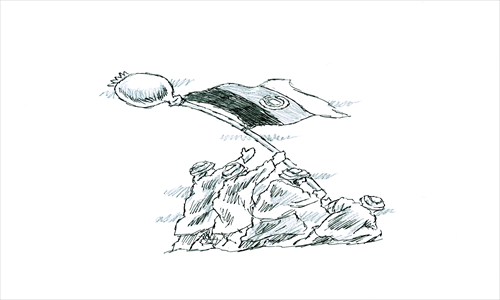Central Asia ignores Afghanistan drug problem at its own peril

The prevalence of drug use is a common threat that the international community faces. The "Golden Crescent," with Afghanistan as its core, has become the world's largest drug production area.
The drug problem in Afghanistan is not simply a criminal and social one, but has a direct impact on regional politics and security.
Last month, Mazhit Yesenbayev, chairman of the Customs Control Committee of the Kazakh Ministry of Finance, expressed his concern over a worsening drug situation in Central Asia after the withdrawal of coalition forces from Afghanistan in 2014.
According to the World Drug Report 2012 released by the United Nations Office on Drugs and Crime, Afghanistan is still the world's largest illicit drug market. In 2011, it produced 5,800 tons of heroin, 61 percent of the world's total.
Since the 1970s, the use of drugs has been prevalent in Afghanistan. The drug problem is closely related to the country's internal and external politics, and has become the economic reason behind the region's political turbulence.
From the Soviet Union's invasion of the region to its own civil war, from the Taliban era to a US-dominated anti-terrorism war, Afghanistan has gradually become a "drug country."
During the Cold War era, Afghanistan was one of the targets of both the US and the Soviet Union amid their contention for hegemony. At that time, the drug issue did not attract much attention. It even became a tool during the two superpowers' confrontation.
After the collapse of the Soviet Union, different warlords contended with each other, and drugs became the economic pillar of these wars.
After the Taliban's rise to power, it issued a ban on opium, and production in 2001 decreased to 185 tons. However, the drug trade has become an important part of the Afghan economy. Before the fall of the Taliban, production had increased again.
Since the anti-terrorism war, Afghanistan has gradually become one of the world's largest drug-producing regions. One of the reasons is that the international community had no united intention to fight against drug crimes.
In March 2012, Russia blocked the US' anti-drug initiative at a conference in Vienna.
Another reason is that a complete drug interest chain has already been formed in Afghanistan, involving various political forces.
The drug problem in Afghanistan greatly affects regional security, not only in the country itself, but also in neighboring regions. Central Asia and South Asia have become important export paths for drugs. The rising drug flow to these regions threatens their security and stability.
Meanwhile, criminal drug groups collided with political forces in these regions, which may trigger political unrest there.
Kyrgyzstan is one example. During the unrest in the southern Kyrgyzstan city of Osh in 2010, organized drug criminals played a vital role.
The drug problem grows more complicated amid competition in the Central Asia and South Asia regions among big powers. Drugs, as leverage used by those powers, add instability to these regions.
The US-led International Security Assistance Force will withdraw from Afghanistan in 2014. The possibility of the country being driven to political turbulence after the withdrawal may worsen the drug problem.
If the international community cannot cooperate effectively over the matter, the drug problem in Afghanistan is likely to spread to the whole region.
The international community should make efforts to establish a government that includes all ethnic groups, tribes and interest groups. Only when the situation there becomes stable can the drug problem be solved.
An "isolation strip" around Afghanistan can also be set up to prevent drugs flowing out of the country.
But so far, there's no hint that these efforts have ever been made by related parties. The future of the drug situation in Afghanistan remains bleak.
The author is a doctoral scholar at the Research Center for Chinese Borderland History and Geography of the Chinese Academy of Social Sciences. opinion@globaltimes.com.cn